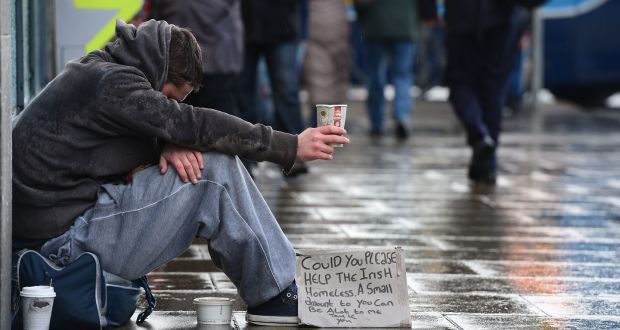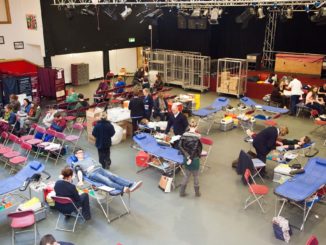
[dropcap]The[/dropcap] building protrudes from concrete aisles of office blocks, asserting its dominant structure over neighbourly dwellings scattered within its range.
Its front windows are coated with graffiti scribblings on the outside and a thick layer of dust on the inside, and the once busy main street entrance is now littered with a sheaf of disposed belongings.
Despite its seemingly calm façade, the building has been the subject of much controversy in the past three months after it came to the attention of Dublin City Council that a group of activists converted the building’s confines into a homeless shelter.
The order to vacate Apollo House in late December, an initiative that put 76 homeless people in temporary accommodation during its 3-month run, has come to an abrupt end.
Figures from the Central Statistics Office show that in 2016, over 198,000 buildings across Ireland were declared vacant. This is an atrocious figure for a country toiling with a homelessness problem that’s been steadily rising since 2014 and has seen the number of people accessing emergency accommodation almost double in the past two years.
In January, the Simon Community surveyed rents across all major locations in Ireland and reported 83 percent of all privately-rented accommodation falls beyond the margin of government rent allowance.
Focus Ireland Director of Advocacy, Mike Allen, also pointed to another catalyst fuelling a major flaw in the rent market. “There are over 15,000 buy-to-let landlords who are in arrears by over 2 years,” Allen says. “Banks and financial institutes are repossessing these homes and evicting the tenants at a rate of over 100 a month.”
But this isn’t the full story. We might see the full picture walking through the streets of the inner city at 7am: where abandoned sleeping bags and articles of clothing lie at the foot of every second shopfront and scores of bodies line the public footpath as they queue for their hot meal.
In July 2016, the numbers prompted a government initiative that focuses on a large-scale building scheme to create over 47,000 housing units over the next four years.
The Rebuilding Ireland plan will focus on solving the housing crisis by dealing with five key issues: tackling homelessness, accelerating social housing, improving rental sector, utilising existing houses and building more new homes.
Minister for Housing, Planning and Local Government, Simon Coveney, called it a ‘far-reaching’ and ‘ambitious’ programme that will “transform housing in a way that will affect every community in Ireland.”
Meanwhile, charities and organisations are urging the public to tackle the crisis with small steps such as donations of clothes and non-perishables.
“A lot of our finances are dependent on the public” says James Phelan of the Simon Community. “Something we’re really calling for at the moment is donations of winter woollies and warm clothes – jackets, jumpers, hats, scarves, that kind of thing.”
A decision on the redevelopment of Apollo House is expected to be announced in May – and as the building awaits its uncertain fate, so do the hundreds of faces on Dublin’s streets as they look to the government to give them a fundamental need most of us so take for granted.
Arthur Velker



